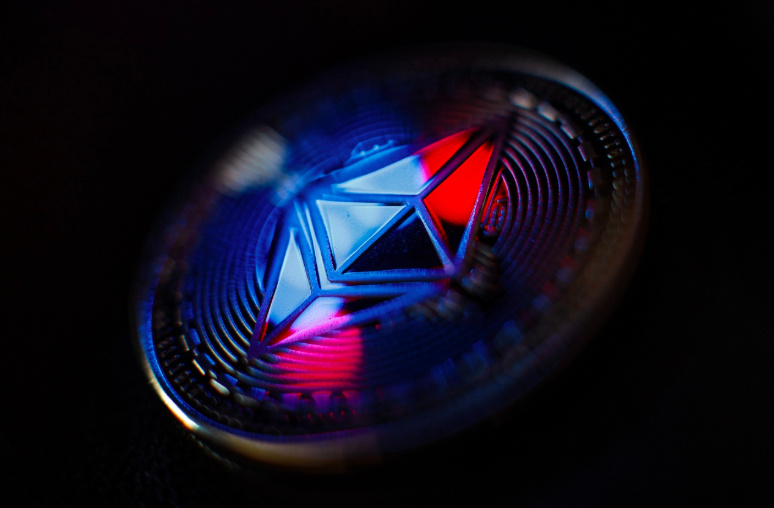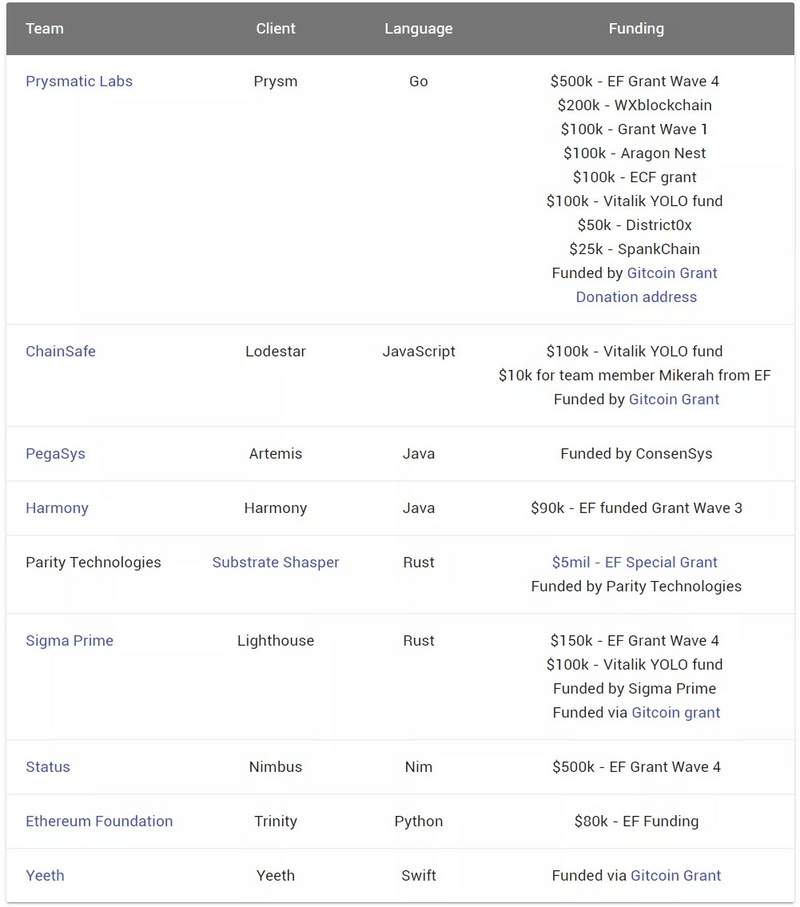The Ethereum Foundation funds $2.46 million to developers to advance Ethereum 2.0

According to Cointelegraph's August 27 report, the Ethereum Foundation announced that it will spend $2.46 million to fund the developers of the Ethereum network to advance the Ethereum 2.0.
On August 26th, the Ethereum Foundation announced in an article published on its official blog that the Ethereum Fund has provided financial support to several Ethereum network client development teams. The task of the relevant team is to create a test network that is compatible with multiple clients.
Before introducing the developers who are currently receiving funding, we first need to know which stages Ethereum 2.0 is mainly divided into. The Ethereum 2.0 system is planned to be delivered through three separate phases, each based on the previous phase:
- Heavy | China Telecom Releases 5G Era Blockchain Smartphone White Paper
- There are only two kinds of coins in the currency circle: community coins and "community coins"
- The central bank’s digital currency is eager to internationalize, and the sword refers to the pricing power of digital assets.
Phase 0 is the beacon chain phase, which implements the PoS (Equity Proof) protocol, which is an alternative to the PoW protocol that protects the entire Ethereum network.
Phase 1 will provide large-scale expansion of the Ethereum network in a fragmented chain, increasing the transaction processing capacity of the entire network by more than 1,000 times.
Phase 2 will implement an executive layer that provides support for user accounts and smart contract functionality, and supports Ethereum to centralize the range of distributed applications required for the future.
At the same time, nine teams from different backgrounds and geographies have participated in the development and construction of the Ethereum 2.0 network through different programming languages:

9 teams of the current Ethereum 2.0 client, source: ethhub.io
According to the announcement of the Ethereum Foundation, the funding for developers is as follows:
Harmony, the developer of the beacon chain, received $189,000 in funding. The beacon chain is based on Ethereum 2.0 and is responsible for managing the PoS protocol and coordinating all independent parallel fragmentation chains, making it the most complex part of the overall system development. In October 2017, Harmony went live, its original Java client in Ethereum, maintained by a group of independent developers called "Ether Camp." This group of developers is now referred to as the "Harmony" team. In June, the Ethereum Foundation just awarded them $90,000 to fund their development for Ethereum 2.0.
Prysmatic Labs, a developer involved in the Prysm client, received $725,000 in funding. Prysmatic Labs was the first team to develop the Ethereum 2.0 client in Go. They launched their system in January 2018. They hope that Ethereum 2.0 can achieve good scalability. The Ethereum 2.0 client developed by this team is called "Prysm", and the opposite is the client "Geth" that is also running on Ethereum and also developed by Go.
Sigma Prime, a developer involved in the Lighthouse client, received $485,000 in funding. Founded in 2016, Sigma Prime is a company focused on information security and blockchain technology consulting. The Ethereum 2.0 client they are developing is called "Lighthouse" ("Lighthouse") and is written in the Rust language. This is the second Ethereum client written in Rust in addition to Parity. Paul Hauner, co-founder of Sigma Prime, told the media that he didn't think their system was fundamentally different from Parity.
The Developer Status participating in the Nimbus client received $500,000 in funding. Status is both a communication platform and a mobile browser, which is specifically designed for Ethereum users. In August 2018, the Status team unveiled their client for Ethereum 2.0, known as "Nimbus", written in Nim. The goal of Status is to promote the widespread use of Ethereum and hope to optimize Nimbus so that it can run on devices with very limited hardware resources. Therefore, running Nimbus requires very little hardware resources, and Nimbus expects to be the first mobile client on Ethereum, allowing Ethereum to run on mobile phones and a variety of handheld devices.
Whiteblock, the developer of the Ethereum 2.0 test network, received $184,000 in funding, which is the new developer of the Ethereum 2.0 network. Whiteblock is a blockchain test platform that helps development teams validate blockchain performance faster and deploy distributed ledger technology.
Password analyst Dmitry Khovratovich received $10,000 to write a report on the security of the first version of ETH 2.0.
Chainsafe received $217,500 in funding for the development of the Lodestar client and javascript. The Chainsafe team is in Toronto, Canada. It is a start-up company that provides a variety of consulting services for projects within the Ethereum ecosystem such as Shyft, Bunz, Aion, Polymath, etc.
Finally, several independent bounty programs are offered: Phase 0 Consensus, Legendre PRF and STARK-Friendly Hash Challenge.
Reference article: "Eight Development Teams in Ethereum"
Produced by Odaily Planet Daily
Translator | Wang Ye
Edit | Lu Xiaoming
We will continue to update Blocking; if you have any questions or suggestions, please contact us!
Was this article helpful?
93 out of 132 found this helpful
Related articles
- Viewpoint | IEO is moving towards death, and the blockchain financing model is imminent!
- Weekly-level volatility is coming to an end, paying attention to long-term opportunities in mainstream currencies
- The Brazilian central bank adopts the IMF classification standard and considers cryptocurrency as a non-financial product.
- The average price is nearly 10,000 yuan, and the cryptocurrency domain name transaction is on fire again?
- Ethereum 2.0: Casper & Beacon Chain
- Is the Ethereum blockchain full? V God commented like this
- The history of 10,000 times of disappearance: the legend is no longer, the value returns




